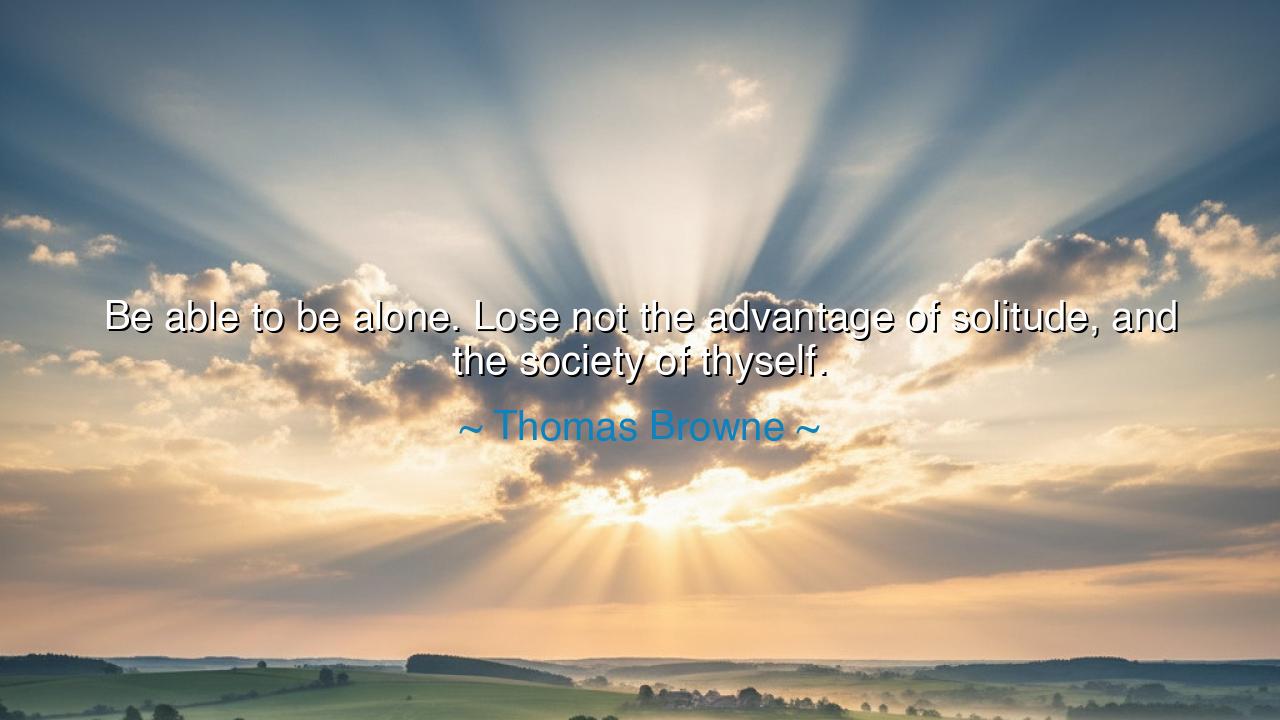
Be able to be alone. Lose not the advantage of solitude, and the






“Be able to be alone. Lose not the advantage of solitude, and the society of thyself.”
So wrote Sir Thomas Browne, the English physician and philosopher whose words glowed with the quiet light of inner contemplation. Living in the seventeenth century, a time of religious tumult and intellectual awakening, Browne saw clearly what many around him could not: that the greatest wealth a person may possess is the ability to be alone — not as punishment, but as power. His counsel was not the cry of one weary of mankind, but the wisdom of one who understood that within the depths of solitude lies the society of the soul — a fellowship richer than the shallow company of the crowd.
To be able to be alone is to master one of life’s highest arts. Many can talk, few can listen; many can love others, but few can endure themselves. Yet Browne reminds us that the self, when rightly known, is the truest companion. In solitude, we meet not the echo of emptiness, but the voice of conscience and creativity. The advantage of solitude is that it clears the fog of the world from the mind, allowing one to see truth as it is — simple, eternal, radiant. To lose that advantage, Browne warns, is to lose the key to wisdom itself, for a person who fears their own company will forever seek distraction instead of understanding.
The ancients knew this truth long before Browne’s pen gave it shape. Socrates walked through Athens conversing with his soul as much as with men; Marcus Aurelius ruled an empire, yet found his truest court within his own thoughts. They both understood that solitude is not absence — it is presence intensified. When the noise of the world falls away, the self awakens, alive and watchful. The one who can dwell comfortably within himself walks through life unafraid, for he carries his peace wherever he goes.
But solitude is not idleness. It is a place of labor — the labor of reflection, growth, and self-discovery. Browne, as a physician of both body and spirit, knew that many of life’s illnesses arise from souls too long estranged from themselves. To live always in the company of others, to depend upon their approval or distraction, is to lose the power of one’s own being. Yet those who keep company with themselves learn to draw from a well that never dries — the well of self-knowledge and inner strength.
Consider the story of Leonardo da Vinci, the painter and inventor whose genius reshaped the world. Though he lived among princes and scholars, he was often solitary, working late into the night by the dim light of his lamp. In his solitude, he spoke with the forces of nature — with light, with form, with imagination. From that “society of himself” arose works of immortal beauty and ideas centuries ahead of their time. His solitude was not loneliness; it was communion — a dialogue between man and creation.
Yet Browne’s wisdom carries also a warning. Solitude, if neglected or misunderstood, can turn to isolation, which weakens rather than strengthens the soul. The purpose of being alone is not to reject the world, but to return to it wiser and calmer. One must walk the inward path often enough to know the sound of one’s own heart, yet not so long that one forgets the songs of others. True solitude prepares the spirit for love, empathy, and understanding — it refines the self so that it may live more fully among humankind.
The lesson of Browne’s words is thus both gentle and powerful: cultivate your solitude. Make time each day to sit in silence, to breathe, to think, to write, to pray. Walk beneath the trees without the burden of conversation; listen to your thoughts as you would to an old friend. Do not fear stillness, for it is the cradle of wisdom. In a world that glorifies constant connection, remember that it is in disconnection that the soul remembers who it is.
So, my child of tomorrow, heed Browne’s teaching: “Be able to be alone.” Guard that inner chamber where your true self dwells. In that quiet, you will find both strength and serenity — and when you step once more into the world, you will bring with you the calm authority of one who knows himself. For the one who is at peace in solitude is never truly alone, but walks always in the radiant company of his own awakened soul.






AAdministratorAdministrator
Welcome, honored guests. Please leave a comment, we will respond soon